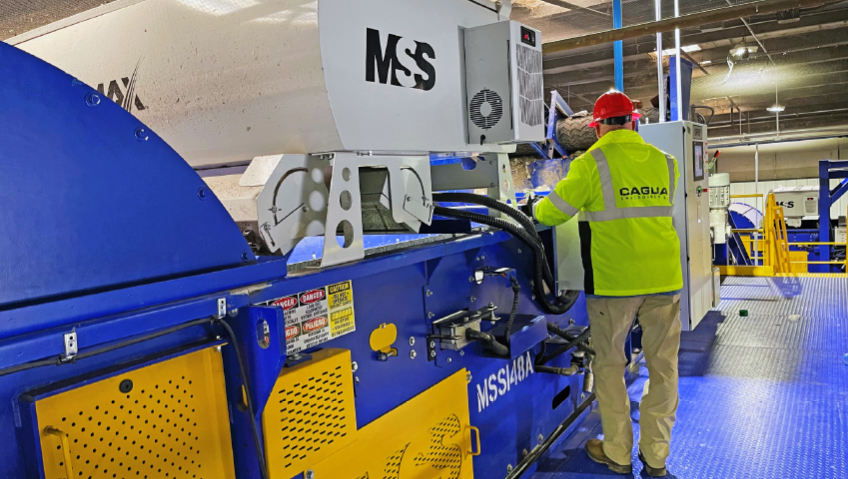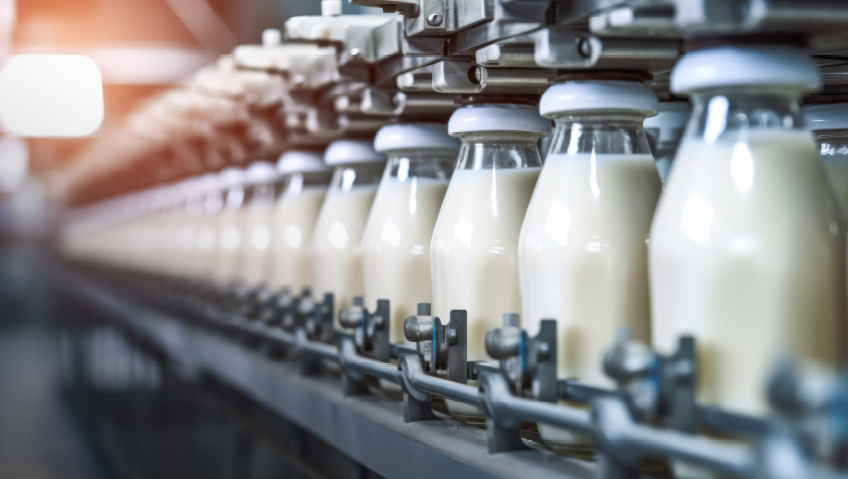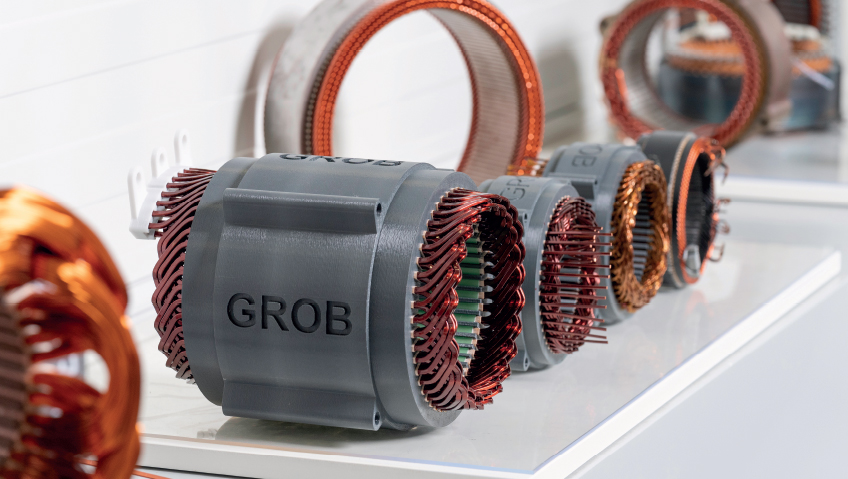Caglia Environmental is a family-owned waste disposal and recycling business with a solid track record of leadership within the industry. After highlighting the company’s innovative approach in 2017 and 2022, Business in Focus sat down with the team again this month to hear the latest developments.
“The waste industry is constantly changing,” so the team needs to stay “five steps ahead,” says Director of Operations, Post Collection, Justin Raymond. Motivation comes from the values promoted by the Caglia family, who emphasize continuous improvement and sustainability. The company wants “to be at the forefront of anything new, great, and environmentally friendly,” he summarizes.
Robotics have been the latest focus. After expanding Fresno’s Cedar Avenue Recycling and Transfer Station (CARTS) in 2022, the team needed to increase efficiency. Robots were a natural next step because they free people to concentrate their efforts in areas of the facility where more labor is needed. “Also, robots just perform well,” says Plant Manager, Corey Stone, PE. “Robots are capable of doing some tasks that humans aren’t capable of. Sometimes that means speed but, more often than not, it’s about detection of material.”
A vast array of materials passes through the facility each day, making fast and efficient detection paramount. Take different types of plastics, for example. Polyethylene terephthalate (PET), low density polyethylene (LDPE), and high-density polyethylene (HDP) must all be carefully sorted—not an easy task for human eyes. So, the company received funding from The Recycling Partnership’s Polypropylene Recycling Coalition grant program to obtain a robot to sort all of this polypropylene plastic.
“Currently, in the line, we have a tandem robot that’s targeting PET and HDPE,” Stone says. “That robot, with its vision system and AI technology, is able to accurately determine [the] material type. Whereas with the naked eye, when you look at a cup or bottle, it’s really hard to tell if it’s LDPE, PET, or HDP. You’re trying to figure out ‘what is this piece of material?’ as it’s flying by you at 200 feet per minute, and that’s really hard for a person to do. That’s where this technology comes into play. In a fraction of a second, it can categorize that material, tell you how much area, estimate the mass, and choose if it should target this material.”
Typically, PET products must go to a secondary facility to be sorted before they can be sold. “In our case, we’re taking a comingled product where there’s everything—fiber, cardboard, metal, aluminum and plastic—and we’re already getting a very sorted product,” says Stone. Achieving this through artificial intelligence is breaking new ground. “To our knowledge, and to The Recycling Partnership’s knowledge, we are now the first single-stream MRF (material recovery facility) who, through sortation, provides three PET products,” he says.
Not surprisingly, the innovative system is catching the industry’s attention. “It generated a lot of buzz with The Recycling Partnership,” he says. “They were excited about it. Of course, Caglia is [eager] to set a precedent of being at the forefront of any sort of sustainability or sorting technology.”
Other facilities are already using the example as inspiration and guidance. “We are very excited about this project, not only for us in our facility… but also for this industry, what that could mean,” Stone says. “We are hearing whispers of other companies potentially building mega-MRFs where they would start doing this, and I think this is a great case that shows this is possible. You can take a comingled product, and you can have very specialized commodity streams. We’re all very proud to be the example set for the rest of the nation for what it looks like to spread PET into multiple products and that it can be done.”
In addition, the team has installed a next-generation robot to sort cans at the facility’s “last chance line,” identifying recyclables that would otherwise evade detection. The robot picks out material “that already went through our system, already went through a series of screens and optical sorters, potentially even areas where there was some human interaction, and it ended up on a belt that was destined for the landfills,” Raymond explains.
Can Manufacturers Institute (CMI) provided funding for the EverestLabs AI through a revenue sharing leasing model that enables MRFs to afford advanced sorting technology. “It was the first time that a robot was funded through CAN Manufacturers Institute in this kind of model,” he says. “It’s so unique in this industry.”
“We capture the aluminum that would otherwise be thrown away, and we share 50 percent of that revenue with them,” Stone explains. “It was really a win-win for us because, even if we’re not getting 100 percent of that value, our ultimate goal is sustainability. We want to make sure that as many recyclables as possible are not going to the landfill.”
This novel partnership is generating buzz as an example of what the industry can achieve by thinking outside the box. The project also has exciting implications that could potentially reach beyond the industry, since it demonstrates that “other companies can get involved in the recycling process even if they’re not a recycler,” Stone says. “We’re hoping that MRFs hear what we’ve done here and replicate that process through other projects of their own.”
Caglia Environmental is at the forefront of adopting new technology, but some things will always stay the same at the company. The team holds fast to the Caglia family values and work ethic that built the business over the decades. “As exciting as the technology is for the family, we get that it all started out with vision, with leadership, passion for the environment, and a passion for people,” says General Manager, Keith Hester. “The people that work here, they love working here. We just had a gentleman retire after 46 years. People come here and they stay here because of the culture the Caglia family has built.”
Founder Frank Caglia immigrated to the United States from Italy in 1920 and settled in Fresno, California. In 1924, at just 12 years old, he began working at the Electric Motor Shop and eventually bought the company after working his way to the top. Frank went on to buy the Orange Avenue Landfill from his father-in-law in 1941. “We owned and operated that for years and years,” Hester says.
The team was committed to sustainability even in those early days of the business. “In 1967, we began celebrating Earth Day—before it was a national holiday,” Hester says. “That’s how passionate the Caglia family was about diverting product.”
The team launched Industrial Waste and Salvage (IWS) in 1971 to collect waste and bring it to the landfill. The forward-thinking mindset continued in the 2000s. Recognizing that the Orange Avenue Landfill was reaching the end of its life, the Caglia family made another investment. “The thought was, this landfill is going to close soon,” says Hester. “We are not going to go out of business. We are going to innovate.”
The family opened CARTS to the public in 2004. The state-of-the-art MRF processes trash, construction and demolition debris, green waste and organic recyclables, and traditional recycling from commercial, government, industrial, and residential customers. The facility recycles more than 70 percent of its collected trash, green/organics, and recyclables, creating raw materials that will be transformed into new consumer products instead of ending up in a landfill.
In 2012, the business catapulted forward once again when Redrock Environmental Group, a Caglia Family Company, won a sizable contract to become the exclusive service provider for the lower elevations of Madera County.
And in 2016, Caglia Environmental made another innovative leap. “We’ve got this landfill that’s sitting there,” says Hester. “We can’t use it anymore. What’s it generating? It’s generating gas. So, we put in a genset and started landfill gas conversion to electricity that actually powered the entire plant here.”
Most recently, the company partnered with CP Manufacturing to expand CARTS, leading to the current state of affairs in which robots became the next logical step. The team is eager to continue adopting the latest technology to keep moving forward to promote sustainability within the industry, but will balance any future growth with the company values that have brought them this far. “We don’t want to be the biggest,” Hester summarizes. “We want to be the best.”






